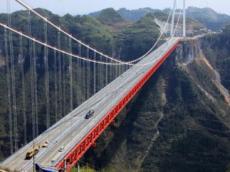|
|
TODAY.AZ / Weird / Interesting
World’s longest tunnel-to-tunnel bridge opened
02 April 2012 [19:20] - TODAY.AZ
 China has done it again, pushing architectural boundaries higher and higher. The Aizhai Bridge is a suspension bridge on the G65 Baotou-Maoming Expressway near Jishou, Hunan. It is the world's highest and longest tunnel-to-tunnel bridge with a main span of 1,146 metres and a deck height of 350 metres.
China has done it again, pushing architectural boundaries higher and higher. The Aizhai Bridge is a suspension bridge on the G65 Baotou-Maoming Expressway near Jishou, Hunan. It is the world's highest and longest tunnel-to-tunnel bridge with a main span of 1,146 metres and a deck height of 350 metres.Construction began in October 2007 and was completed in Dec 2011 with the assistance of a $208 million load from the Asian Development Bank, cutting travel time from Jishou to Chadong from four hours to less than one hour.
According to Chen Mingxian, a renowned bridge expert and commander of the Aizhai bridge construction headquarters, the Aizhai Bridge bridges the Jishou-Chadong Highway with its steel truss girder bridge. Although it won't be not the highest bridge in the world by deck height (interestingly, this title also belongs to the Chinese, the Si Du River Bridge has a deck height of a staggering 496 metres), the Hunan Road and Bridge Construction Group and its partners created four No.1s (according to them) in the world architectural feats -- First, the construction of its 1,146m long main span suspension bridge that crosses its canyon; Second, the first use of a pylon and girder separation structure; Third, the first use of a rock anchor in suspension and the use of carbon fiber as its pre-stressed reinforcement material; and lastly, the first adoption of rail cable sliding techniques used to erect the steel truss girder.
To most layman Chinese, it is just one really high bridge and another fine symbol of Chinese architectural genius, in line with the spirit of China's rapid development. It is claimed the bridge had the strong support of the locals. At their request, Aizhai was opened up briefly prior to its operational opening during the Spring Festival for touring visits. Like most Chinese events, people of all ages flood the bridge daily in the tens of thousands. Security and health issues cropped up due to the massive movement and the number of local entrepreneurs popping up to sell snacks and refreshments. Due to the lack of cleaning initiatives, a common feature of mass crowds all over the world and especially in China, the grand bridge of Aizhai began to be cluttered with rubbish, spoiling the beautiful scenery of the area and their very symbol of pride. The bridge has hence been re-closed for sanitisation, ready for the actual reopening.
There is the Great Wall, and then there is the Great Bridge. What's next? Building castles in the air does not seem like a Chinese dream anymore.
URL: http://www.today.az/news/interesting/104731.html
 Print version
Print version
Views: 2103
Connect with us. Get latest news and updates.
See Also
- 05 February 2025 [19:41]
Japan plans to negotiate with Trump to increase LNG imports from United States - 23 January 2025 [23:20]
Dubai once again named cleanest city in the world - 06 December 2024 [22:20]
Are scented candles harmful to health? - 23 November 2024 [14:11]
Magnitude 4.5 earthquake hits Azerbaijan's Lachin - 20 November 2024 [23:30]
Launch vehicle with prototype of Starship made its sixth test flight - 27 October 2024 [09:00]
Fuel prices expected to rise in Sweden - 24 October 2024 [19:14]
Turkiye strikes terror targets in Iraq and Syria - 23 October 2024 [23:46]
Kazakhstan supplied almost entire volume of oil planned for 2024 to Germany in 9 months - 23 October 2024 [22:17]
Taiwan reported passage of Chinese Navy aircraft carrier near island - 23 October 2024 [21:50]
Russia remains largest oil supplier to India
Most Popular
 Pashinyan signed up for a ChatGPT course
Pashinyan signed up for a ChatGPT course
 Mono-Armenia what tales did Pashinyan tell in Washington
Mono-Armenia what tales did Pashinyan tell in Washington
 Turkiye’s President Erdo?an approves migration cooperation agreement with Azerbaijan
Turkiye’s President Erdo?an approves migration cooperation agreement with Azerbaijan
 Ruins of an Azerbaijani mosque are being desecrated in Yerevan
Ruins of an Azerbaijani mosque are being desecrated in Yerevan
 Azerbaijan bans entry of Russian MP over offensive remarks
Azerbaijan bans entry of Russian MP over offensive remarks
 Armenians are preparing for a "crusade" against Baku – hopes for the United States
Armenians are preparing for a "crusade" against Baku – hopes for the United States
 Azerbaijan’s fire safety service reviews 2024 successes and prepares for 2025
Azerbaijan’s fire safety service reviews 2024 successes and prepares for 2025
